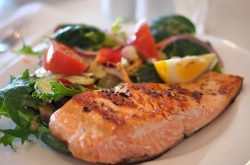Gastroesophageal reflux disease (GERD), also known as acid reflux, is a long-term condition in which stomach contents rise up into the esophagus, resulting in either symptoms or complications. Symptoms include the taste of acid in the back of the mouth, heartburn, bad breath, chest pain, regurgitation, breathing problems, and wearing away of the teeth. Complications include esophagitis, esophageal stricture, and Barrett’s esophagus.
What is Acid Reflux and GERD
Acid reflux happens when contents from your stomach move up into your esophagus. It’s also called acid regurgitation or gastroesophageal reflux.
If you have symptoms of acid reflux more than twice a week, you might have a condition known as gastroesophageal reflux disease (GERD).
According to the National Institute of Diabetes and Digestive and Kidney Diseases (NIDDK), GERD affects about 20 percent of people in the United States. If left untreated, it can sometimes cause serious complications.
GERD symptoms
Acid reflux can cause an uncomfortable burning feeling in your chest, which can radiate up toward your neck. This feeling is often known as heartburn.
If you have acid reflux, you might develop a sour or bitter taste at the back of your mouth. It might also cause you to regurgitate food or liquid from your stomach into your mouth.
In some cases, GERD can cause difficulty swallowing. It can sometimes lead to breathing problems, like a chronic cough or asthma.
GERD causes
The lower esophageal sphincter (LES) is a circular band of muscle at the end of your esophagus. When it’s working properly, it relaxes and opens when you swallow. Then it tightens and closes again afterwards.
Acid reflux happens when your LES doesn’t tighten or close properly. This allows digestive juices and other contents from your stomach to rise up into your esophagus.
GERD treatment options
To prevent and relieve symptoms of GERD, your doctor might encourage you to make changes to your eating habits or other behaviors.
They might also suggest taking over-the-counter medications, like:
- antacids
- H2 receptor blockers
- proton pump inhibitors (PPIs)
In some cases, they might prescribe stronger H2 receptor blockers or PPIs. If GERD is severe and not responding to other treatments, surgery might be recommended.
Surgery for GERD
In most cases, lifestyle changes and medications are enough to prevent and relieve symptoms of GERD. But sometimes, surgery is needed.
For example, your doctor might recommend surgery if lifestyle changes and medications alone haven’t stopped your symptoms. They might also suggest surgery if you’ve developed complications of GERD.
Diagnosing GERD
If your doctor suspects you might have GERD, they’ll conduct a physical exam and ask about any symptoms you’ve been experiencing.
They might use one or more of the following procedures to confirm a diagnosis or check for complications of GERD:
- barium swallow: after drinking a barium solution, X-ray imaging is used to examine your upper digestive tract
- upper endoscopy: a flexible tube with a tiny camera is threaded into your esophagus to examine it and collect a sample of tissue (biopsy) if needed
- esophageal manometry: a flexible tube is threaded into your esophagus to measure the strength of your esophageal muscles
- esophageal pH monitoring: a monitor is inserted into your esophagus to learn if and when stomach acid enters it
Risk factors for GERD
Certain conditions can increase your chances of developing GERD, including:
- obesity
- pregnancy
- hiatal hernia
- connective tissue disorders
Some lifestyle behaviors can also raise your risk of GERD, including:
- smoking
- eating large meals
- lying down or going to sleep shortly after eating
- eating certain types of foods, such as deep fried or spicy foods
- drinking certain types of beverages, such as soda, coffee, or alcohol
- using nonsteroidal anti-inflammatory drugs (NSAIDS), such as aspirin or ibuprofen
Potential complications of GERD
In most people, GERD doesn’t cause serious complications. But in rare cases, it can lead to serious or even life-threatening health problems.
Potential complications of GERD include:
- esophagitis, an inflammation of your esophagus
- esophageal stricture, which happens when your esophagus narrows or tightens
- Barrett’s esophagus, involving permanent changes to the lining of your esophagus
- esophageal cancer, which affects a small portion of people with Barrett’s esophagus
- asthma, chronic cough, or other breathing problems, which may develop if you breath stomach acid into your lungs
- tooth enamel erosion, gum disease, or other dental problems
To lower your chances of complications, it’s important to take steps to prevent and treat the symptoms of GERD.
Diet and GERD
In some people, certain types of foods and beverages trigger symptoms of GERD. Common dietary triggers include:
- high-fat foods
- spicy foods
- chocolate
- citrus fruit
- pineapple
- tomato
- onion
- garlic
- mint
- alcohol
- coffee
- tea
- soda
Home remedies for GERD
There are several lifestyle changes and home remedies that may help relieve GERD symptoms.
For example, it might help to:
- quit smoking
- lose excess weight
- eat smaller meals
- chew gum after eating
- avoid lying down after eating
- avoid foods and drinks that trigger your symptoms
- avoid wearing tight clothing
- practice relaxation techniques
Some herbal remedies might also provide relief.
Herbs commonly used for GERD include:
- chamomile
- licorice root
- marshmallow root
- slippery elm
Although more research is needed, some people report experiencing relief from acid reflux after taking supplements, tinctures, or teas that contain these herbs.
Anxiety and GERD
According to 2015 researchTrusted Source, anxiety might make some of the symptoms of GERD worse.
If you suspect that anxiety is making your symptoms worse, consider talking to your doctor about strategies to relieve it.
Some things you can do to reduce anxiety include:
- limit your exposure to experiences, people, and places that make you feel anxious
- practice relaxation techniques, like meditation or deep breathing exercises
- adjust your sleep habits, exercise routine, or other lifestyle behaviors
If your doctor suspects you have an anxiety disorder, they might refer you to a mental health specialist for diagnosis and treatment. Treatment for an anxiety disorder might include medication, talk therapy, or a combination of both.
Pregnancy and GERD
Pregnancy can increase your chances of experiencing acid reflux. If you had GERD before getting pregnant, your symptoms might get worse.
Hormonal changes during pregnancy can cause the muscles in your esophagus to relax more frequently. A growing fetus can also place pressure on your stomach. This can increase the risk of stomach acid entering your esophagus.
Many medications that are used to treat acid reflux are safe to take during pregnancy. But in some cases, your doctor might advise you to avoid certain antacids or other treatments.
Asthma and GERD
It’s been reported that more than 75 percent of people with asthma also experience GERD.
More research is needed to understand the exact relationship between asthma and GERD. It’s possible that GERD might make symptoms of asthma worse. But asthma and some asthma medications might raise your risk of experiencing GERD.
IBS and GERD
Irritable bowel syndrome (IBS) is a condition that can affect your large intestine. Common symptoms include:
- abdominal pain
- bloating
- constipation
- diarrhea
According to a recent reviewTrusted Source, GERD-related symptoms are more common in people with IBS than the general population.
If you have symptoms of both IBS and GERD, make an appointment with your doctor. They might recommend changes to your diet, medications, or other treatments.
Drinking alcohol and GERD
In some people with GERD, certain foods and drinks can make the symptoms worse. Those dietary triggers might include alcoholic beverages.
Depending on your specific triggers, you might be able to drink alcohol in moderation. But for some people, even small amounts of alcohol trigger symptoms of GERD.
If you combine alcohol with fruit juices or other mixers, those mixers might also trigger symptoms.
The difference between GERD and heartburn
Heartburn is a common symptom of acid reflux. Most people experience it from time to time, and in general, occasional heartburn isn’t a cause for concern.
But if you get heartburn more than twice a week, you might have GERD.

Acid reflux in infants: symptoms, and treatment
Also called: GER in Infants, GERD in infants, Pediatric Gastroesophageal Reflux
What are reflux (GER) and GERD?
The esophagus is the tube that carries food from your mouth to your stomach. If your baby has reflux, his or her stomach contents come back up into the esophagus. Another name for reflux is gastroesophageal reflux (GER).
GERD stands for gastroesophageal reflux disease. It is a more serious and long-lasting type of reflux. Babies may have GERD if their symptoms prevent them from feeding or if the reflux lasts more than 12 to 14 months.
What causes reflux and GERD in infants?
There is a muscle (the lower esophageal sphincter) that acts as a valve between the esophagus and stomach. When your baby swallows, this muscle relaxes to let food pass from the esophagus to the stomach. This muscle normally stays closed, so the stomach contents don’t flow back into the esophagus.
In babies who have reflux, the lower esophageal sphincter muscle is not fully developed and lets the stomach contents back up the esophagus. This causes your baby to spit up (regurgitate). Once his or her sphincter muscle fully develops, your baby should no longer spit up.
In babies who have GERD, the sphincter muscle becomes weak or relaxes when it shouldn’t.
How common are reflux and GERD in infants?
Reflux is very common in babies. About half all babies spit up many times a day in the first 3 months of their lives. They usually stop spitting up between the ages of 12 and 14 months.
GERD is also common in younger infants. Many 4-month-olds have it. But by their first birthday, only 10 percent of babies still have GERD.
What are the symptoms of reflux and GERD in infants?
In babies, the main symptom of reflux and GERD is spitting up. GERD may also cause symptoms such as
- Arching of the back, often during or right after eating
- Colic – crying that lasts for more than 3 hours a day with no medical cause
- Coughing
- Gagging or trouble swallowing
- Irritability, especially after eating
- Poor eating or refusing to eat
- Poor weight gain, or weight loss
- Wheezing or trouble breathing
- Forceful or frequent vomiting
NIH: National Institute of Diabetes and Digestive and Kidney Diseases
How do doctors diagnose reflux and GERD in infants?
In most cases, a doctor diagnoses reflux by reviewing your baby’s symptoms and medical history. If the symptoms do not get better with feeding changes and anti-reflux medicines, your baby may need testing.
Several tests can help a doctor diagnose GERD. Sometimes doctors order more than one test to get a diagnosis. Common tests include
- Upper GI series, which looks at the shape of your baby’s upper GI (gastrointestinal) tract. Your baby will drink or eat a contrast liquid called barium. The barium is mixed in with a bottle or other food. The health care professional will take several x-rays of your baby to track the barium as it goes through the esophagus and stomach.
- Esophageal pH and impedance monitoring, which measures the amount of acid or liquid in your baby’s esophagus. A doctor or nurse places a thin flexible tube through your baby’s nose into the stomach. The end of the tube in the esophagus measures when and how much acid comes up into the esophagus. The other end of the tube attaches to a monitor that records the measurements. Your baby will wear this for 24 hours, most likely in the hospital.
- Upper gastrointestinal (GI) endoscopy and biopsy, which uses an endoscope, a long, flexible tube with a light and camera at the end of it. The doctor runs the endoscope down your baby’s esophagus, stomach, and first part of the small intestine. While looking at the pictures from the endoscope, the doctor may also take tissue samples (biopsy).
What feeding changes can help treat my infant’s reflux or GERD?
Feeding changes may help your baby’s reflux and GERD:
- Add rice cereal to your baby’s bottle of formula or breastmilk. Check with the doctor about how much to add. If the mixture is too thick, you can change the nipple size or cut a little “x” in the nipple to make the opening larger.
- Burp your baby after every 1 to 2 ounces of formula. If you breastfeed, burp your baby after nursing from each breast.
- Avoid overfeeding; give your baby the amount of formula or breast milk recommended.
- Hold your baby upright for 30 minutes after feedings.
- If you use formula and your doctor thinks that your baby may be sensitive to milk protein, your doctor may suggest switching to a different type of formula. Do not change formulas without talking to the doctor.
What treatments might the doctor give for my infant’s GERD?
If feeding changes do not help enough, the doctor may recommend medicines to treat GERD. The medicines work by lowering the amount of acid in your baby’s stomach. The doctor will only suggest medicine if your baby still has regular GERD symptoms and
- You already tried some feeding changes
- Your baby has problems sleeping or feeding
- Your baby does not grow properly
The doctor will often prescribe a medicine on a trial basis and will explain any possible complications. You shouldn’t give your baby any medicines unless the doctor tells you to.
Medicines for GERD in babies include
- H2 blockers, which decrease acid production
- Proton pump inhibitors (PPIs), which lower the amount of acid the stomach makes
If these don’t help and your baby still has severe symptoms, then surgery might be an option. Pediatric gastroenterologists only use surgery to treat GERD in babies in rare cases. They may suggest surgery when babies have severe breathing problems or have a physical problem that causes GERD symptoms.
Sources: Healthline , Medlineplus , Wikipedia

